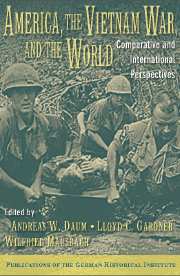Book contents
- Frontmatter
- Introduction
- Part One Relocating Vietnam Comparisons in Time and Space
- Part Two International Relations and the Dynamics of Alliance Politics
- 7 Who Paid for America’s War?
- 8 America Isolated
- 9 Bamboo in the Shadows
- 10 The Strategic Concerns of a Regional Power
- 11 People’s Warfare Versus Peaceful Coexistence
- Part Three Recasting Vietnam: Domestic Scenes and Discourses
- Index
9 - Bamboo in the Shadows
Relations Between the United States and Thailand During the Vietnam War
Published online by Cambridge University Press: 05 January 2013
- Frontmatter
- Introduction
- Part One Relocating Vietnam Comparisons in Time and Space
- Part Two International Relations and the Dynamics of Alliance Politics
- 7 Who Paid for America’s War?
- 8 America Isolated
- 9 Bamboo in the Shadows
- 10 The Strategic Concerns of a Regional Power
- 11 People’s Warfare Versus Peaceful Coexistence
- Part Three Recasting Vietnam: Domestic Scenes and Discourses
- Index
Summary
With the Union Army bogged down in the Potomac Valley during the winter of 1862, Abraham Lincoln could have used all the help he could get to bring the American Civil War to a successful conclusion. Among the more curious propositions he received was an offer of war elephants from King Mongkut (Phra Chom Klao, or Rama IV, 1851-68) of Siam. Although the beleaguered president may have happily contemplated the specter of bull elephants in full armor crashing through Confederate lines, he graciously declined the king's gift. It would be a problem, Lincoln said, because “our political jurisdiction does not reach a latitude so low as to favor the multiplication of the elephant.”
One hundred years later, the Thais again offered to assist in an American war, this time much closer to home and far more important to their nation and society. The Vietnam War era was without question the most significant period in the history of diplomatic relations between the United States and Thailand. During the 1950s and 1960s, the two countries developed an extremely close relationship premised on the need to contain the perceived spread of communism in Southeast Asia. For the United States, Thailand represented a bastion of anticommunism in a region plagued by political uncertainty. It also represented a valuable Asian ally in the Cold War and a strategic base from which to prosecute both overt and covert military operations in Indochina. For Thailand, the United States represented protection from both the external threat of communist neighbors and the risk that an indigenous communist insurgency posed.
- Type
- Chapter
- Information
- America, the Vietnam War, and the WorldComparative and International Perspectives, pp. 197 - 220Publisher: Cambridge University PressPrint publication year: 2003



